The Two Popes
Zhang Sanjian 2022-03-13 11:03
Pope Bergoglio calls an airline’s reservation hotline to book a flight for himself, only to receive the final response of ‘Very funny.’ (It seems that taking the first step is often difficult, and one might be met with the ridicule of others. (chuckle secretly ))
 The core conflict of the film comes from the conservative and reformist factions within the church. The contradiction arises from the representative of the reformists, the Latin American bishop Bergoglio, who submits his resignation to Pope Benedict XVI.
The core conflict of the film comes from the conservative and reformist factions within the church. The contradiction arises from the representative of the reformists, the Latin American bishop Bergoglio, who submits his resignation to Pope Benedict XVI.
In the dialogue between the two men, we see the clash of ideas sparked by the conservative and reformist sides. Bergoglio’s reason for resigning is that he no longer wants to be a salesman, a salesman for a product, especially a product that he cannot endorse in good conscience.
Change and Compromise
Change means actively adapting to the development of the era, and seeking breakthroughs in thought and action. However, what should not change are our original intentions and our belief in goodness.
Compromise represents the changes we make after being forced to submit to money or power, at the cost of betraying our conscience.
We may inadvertently do things that violate our basic morals and conscience. When we realize this, we should stop. A wrong decision is like a snowball; if not stopped in time, it grows bigger and leads to an avalanche. (As a saying popular among netizens goes, ‘In an avalanche, no snowflake is innocent.’) I increasingly believe that clear awareness and a firm stance are especially important. Even in a fleeting moment, we should not miss the chance to make a clear judgment.
Self-Reflection and Gratitude.
One of the core beliefs of Catholicism is that ‘humans are born sinful.’ Therefore, our existence in this world is for atonement. We need to pray and confess, which is also a continuous process of self-reflection. Consciousness is a basic attribute of humans; people progress by continually reflecting on their mistakes, while also restraining the evil desires inherent in their instincts.
Confucius also said in the ‘Analects, “I reflect on myself three times a day,” implying that constant self-examination enables one to improve and be seen differently even after a short period.
For example, after arguing with my mother, did I respect her enough? When I spoke to my employees in a fit of anger, did I pass my negative emotions onto them? Have I been turning off lights and water to conserve Earth’s resources? Seemingly small actions reflect a person’s upbringing and quality. Just like saying ‘thank you’ a bit more might bring extra warmth to others.
Catholics pray before meals: ‘Dear Heavenly Father, thank you for the sunshine and rain that produce abundant food on earth, and please cleanse this food for us, we pray in the name of Jesus Christ, Amen!’
“At noon, hoeing in the fields, sweat drips down to the soil. Who knows that each grain on the plate, each represents hard work.” This is an ancient Chinese poem familiar to all Chinese. Catholics are grateful to God, while we are grateful to the hardworking farmers.
❤️ Grateful for parents’ nurturing love ❤️ Grateful for teachers’ guidance and answers ❤️ Grateful for friends’ timely help ❤️ Grateful for leaders’ recognition and support ❤️ Grateful for colleagues and classmates’ mutual assistance ❤️… Having a grateful heart at all times makes one more open and cheerful in dealing with others. (Sanjian is not a Catholic, but believes in karma.)
Close Friends
Spending a long time alone can easily lead to losing oneself. Therefore, having a companion to share and communicate with becomes particularly important, and this is no exception for the Pope.
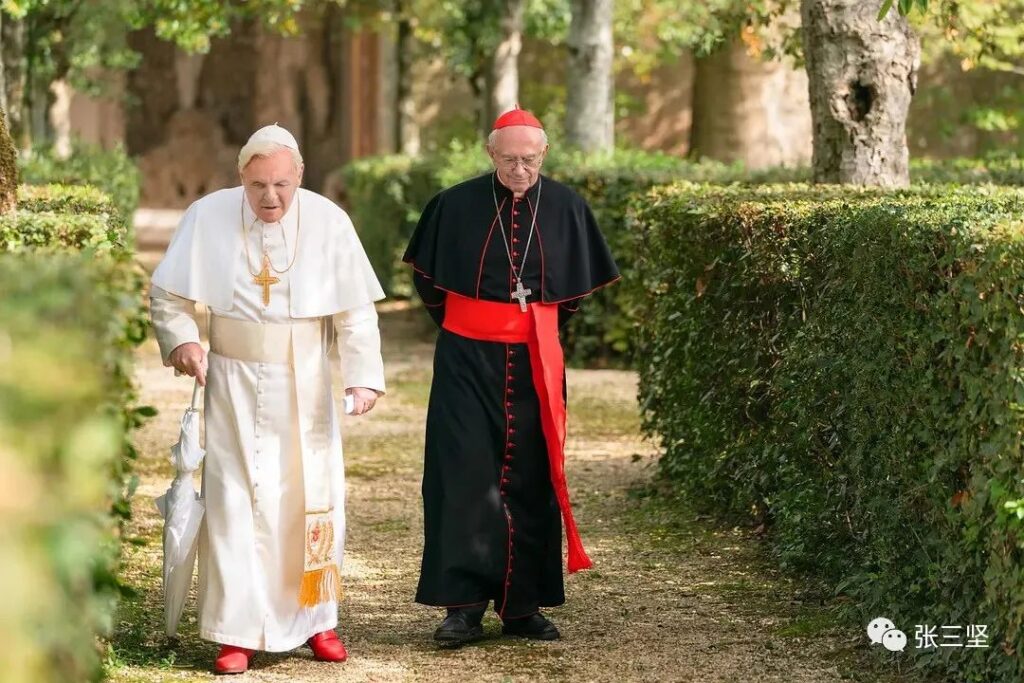 The two Popes have starkly different lifestyles. One prefers dining alone, enjoying traditional dishes prepared by the chef, while the other likes seeking out street food; one resides in an ancient castle, while the other enjoys the more earthly and lively atmosphere of ordinary life; one enjoys playing the piano, while the other likes tango and football.
The two Popes have starkly different lifestyles. One prefers dining alone, enjoying traditional dishes prepared by the chef, while the other likes seeking out street food; one resides in an ancient castle, while the other enjoys the more earthly and lively atmosphere of ordinary life; one enjoys playing the piano, while the other likes tango and football.
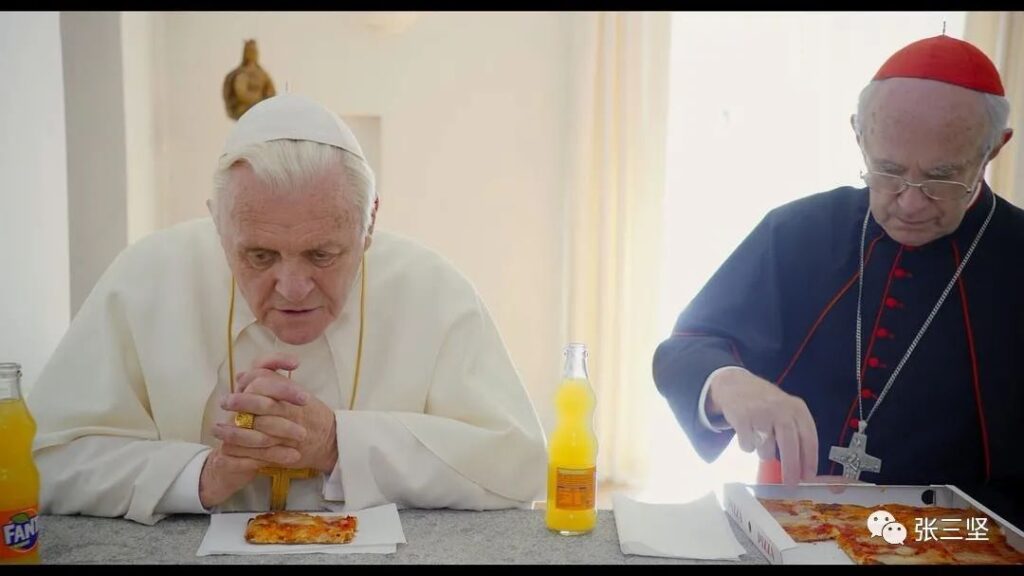 When Bergoglio pulls Benedict XVI’s hand to dance the tango, when Benedict XVI tries street-side pizza, when the two watch the World Cup final together, is this Benedict XVI’s compromise?
When Bergoglio pulls Benedict XVI’s hand to dance the tango, when Benedict XVI tries street-side pizza, when the two watch the World Cup final together, is this Benedict XVI’s compromise?
……
When the two priests confess to each other, revealing secrets that are hard to voice from the bottom of their hearts, they find redemption and their souls become closely connected.
Benedict XVI voluntarily steps down from the papacy, and Bergoglio becomes the first Pope from Latin America. Upon hearing this news, he immediately calls Ratzinger and asks everyone to pray for Benedict XVI during his inauguration ceremony. Ratzinger watches all this on television. (It gives a sense of mutual admiration between heroes.)
This first Pope from Latin America maintained his consistent style, rejecting red shoes and the lavish papal cloak, wishing to present a simpler, more approachable image to the world. He continues to venture into the world of the poor, feeling their suffering and inspiring people. “Any journey, no matter how long, has to start somewhere. Any journey, no matter how glorious, can start with a mistake. So, when you feel lost, don’t worry. God will not give up. ” (First, you must not give up on yourself.)
The film showcases the artistic charm of religion, with magnificent architecture, exquisite murals, superbly crafted statues, and solemn attire, and it also enlightens us about the difference between black smoke and white smoke in the election of a Pope.”
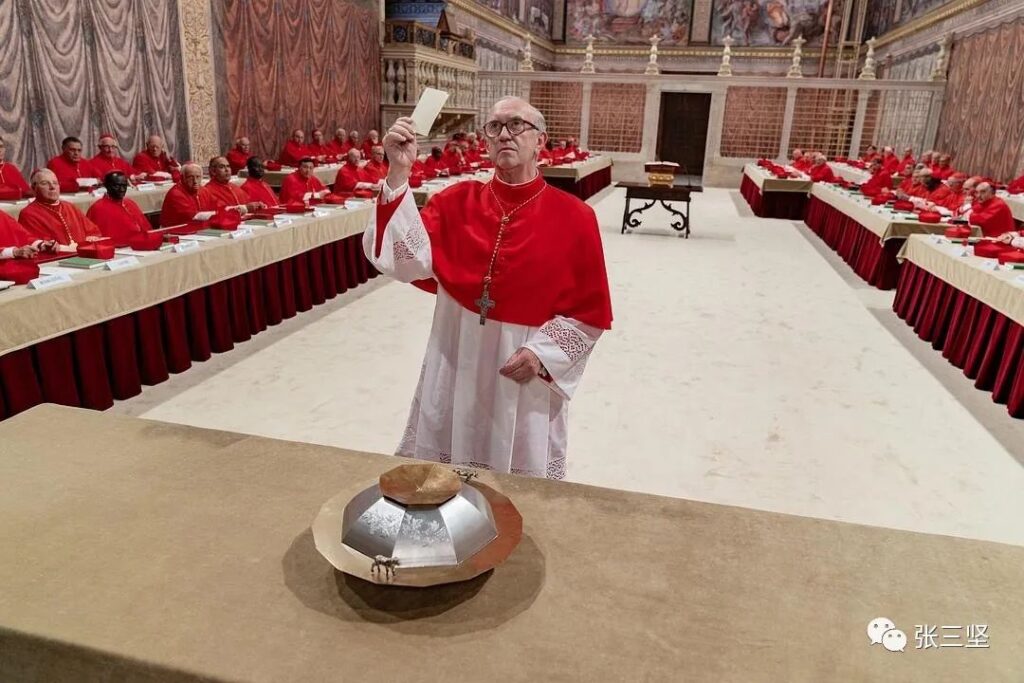 In the film, we can see many shaky camera shots. This technique enhances the sense of interaction and ‘breath’ between the two Popes, making the audience feel more immersed in the scene.
In the film, we can see many shaky camera shots. This technique enhances the sense of interaction and ‘breath’ between the two Popes, making the audience feel more immersed in the scene.
The actor playing Bergoglio never forgets his character’s intention to ‘resign’ to Pope Benedict XVI. Every time he brings out the resignation letter and provokes a reaction from the Pope, it results in a humorous clash between the characters.
A teacher once told me that a good scene between two actors is like playing table tennis. There is always an offensive and a defensive side, and sometimes these roles switch back and forth. The performance duel between these two veteran actors brings a sense of fun to what might otherwise be a somewhat heavy film.
At the end of the film, during the World Cup final between Germany and Argentina, they drink beer, eat pizza, and cheer for their respective countries! At the same time, they don’t forget to tease each other. Isn’t this just how we interact with our good friends?
The end credits are also in colorful letters, as if to tell everyone that the world is inherently rich and diverse, just like the different colors and patterns of national flags and the varied cultures and customs of each country.
What we love is this human touch and the warmth of everyday life.
Bergoglio shares an amusing story with Benedict XVI.
Bergoglio: You know the story, the two seminarians who liked to smoke?
Benedict XVI: No.
Bergoglio: They were supposed to resist smoking—
The first student goes to his spiritual director and says, “Father, is it permitted to smoke while praying?”
And the director says, “No. Of course not.”
The second student, a Jesuit, says to the first, ‘Brother, you asked the wrong question.’ So, he goes to the director and asks, “Father, is it permitted to pray while smoking?”
Benedict XVI: Yes, Pray and smoke at the same time… That’s a joke.




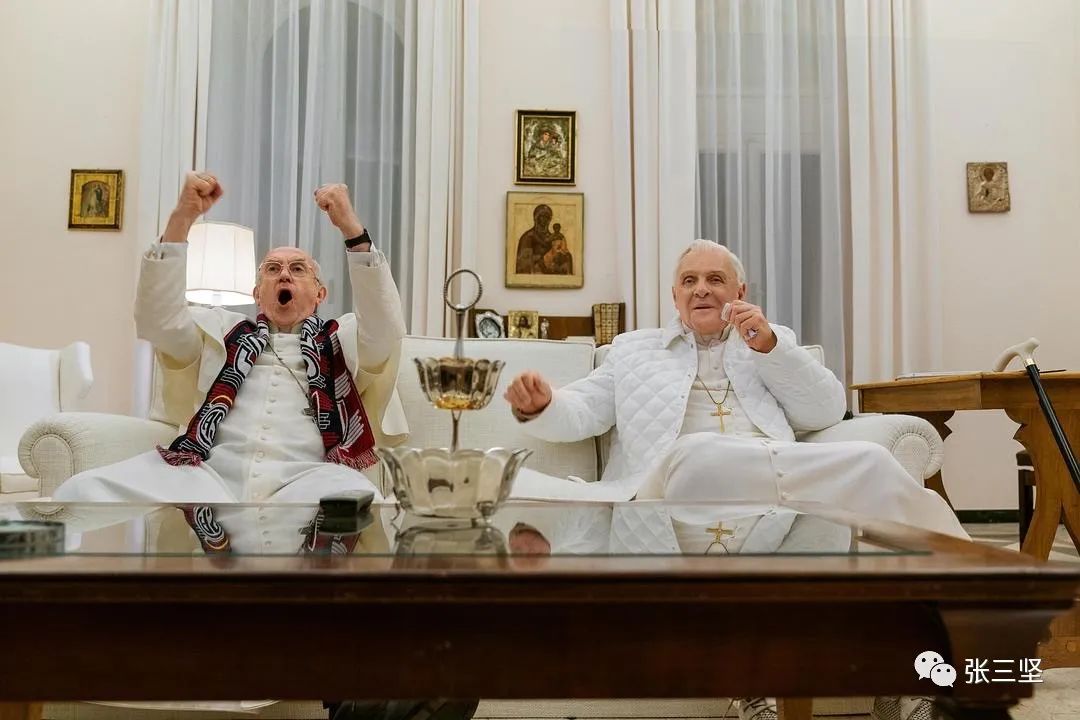
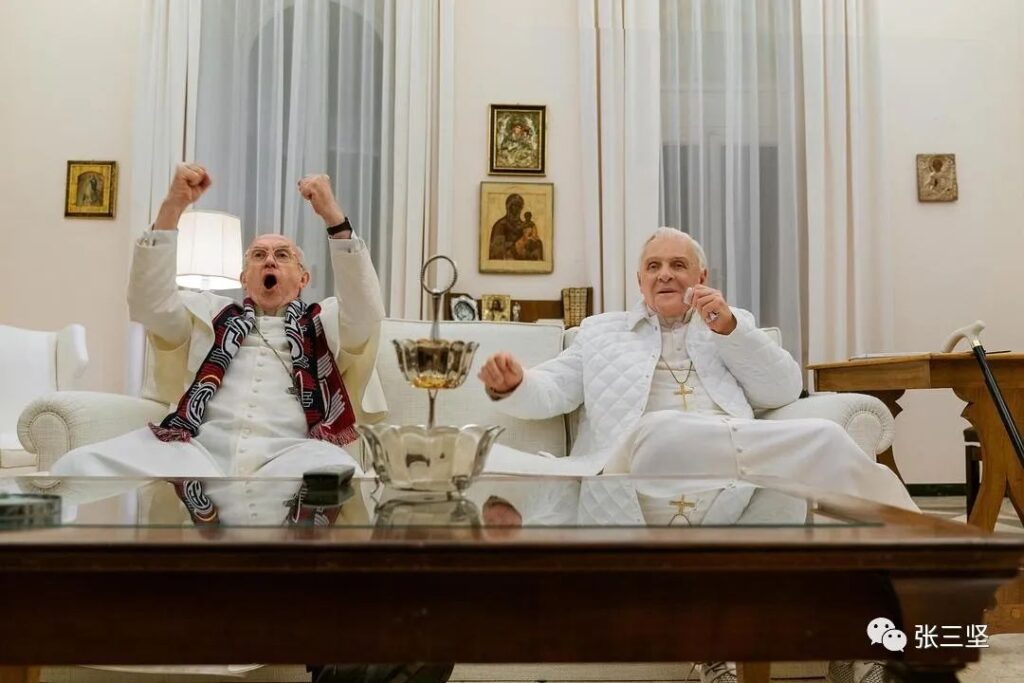


Are you busy ?
翻译 Translate
I can read your articles many times but can’t finish crack up 😓😓
翻译 Translate
Read it again ❤️❤️❤️
翻译 Translate
I’m back!!
翻译 Translate
I definitely find time to watch ‘ 2 popes’ thanks again for reviewed.
翻译 Translate
I never read this article before. Thanks for keeping it here.
翻译 Translate
This story was recommended to me by Sanjian, and the metaphor of the old giving way to the new was truly eye-opening for me.
翻译 Translate